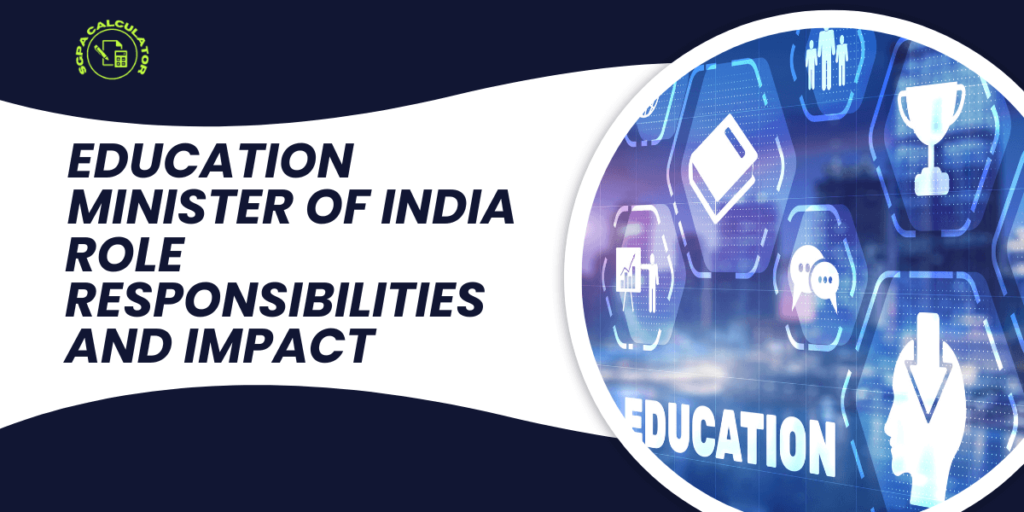Education is the foundation of a nation’s progress, and India’s Education Minister plays a critical role in determining the country’s future by regulating its education system. The post of Education Minister is critical because it entails developing policies, implementing reforms, and ensuring that all citizens have access to high-quality education. This article examines the Education Minister of India’s role, responsibilities, and impact on promoting an equitable and progressive education system.
Historical Consideration
In India, the position of Education Minister has a long and storied history. India realised the importance of education in nation-building after attaining independence in 1947 and made considerable strides in extending its educational infrastructure. Maulana Abul Kalam Azad, a notable liberation fighter and scholar, served as India’s first Education Minister from 1947 until 1958. Since then, numerous renowned persons who have contributed to the expansion and change of India’s education sector have held the role.
Read Our Blog: Global Education Share Price
Responsibilities and Role
The Education Minister of India is a major member of the Union Cabinet with significant responsibilities. The Education Minister has the following key functions and responsibilities:
Formulating Education Policies: One of the Education Minister’s primary responsibilities is to develop and administer comprehensive education policies. Curriculum development, teacher training, infrastructure development, and the promotion of research and innovation are all covered by these policies.
Oversight of Educational Institutions: The Education Minister is in charge of numerous educational institutions, such as schools, colleges, and universities. This includes ensuring that these institutions maintain high educational standards and follow the norms established by the federal government.
Budget Allocation: The Education Minister is responsible for allocating funds to the education sector. They push for enough financing to help establish and expand educational infrastructure and services.
Inclusion: The Education Minister aims to increase inclusion in the educational system. This entails taking steps to guarantee that education is available to all segments of society, regardless of socioeconomic status or physical ability.
Implementing changes: The Education Minister introduces changes and innovations in the curriculum and evaluation systems to keep the education system in line with the changing needs of society and the labour market.
Encourage Research and Development: The Education Minister/ Central Board of Secondary Education promotes a research and development culture in the education sector. They support programs that foster innovation and advancement in a variety of fields of study.
worldwide Collaborations: The Education Minister represents India on educational worldwide platforms and works with other countries to share information and best practices.
The Effect on the Educational System
The function of India’s Education Minister has a significant impact on the education system and, as a result, the nation’s overall development. Here are some of the most important ways that the Education Minister’s decisions and policies affect the educational landscape:
Education Quality: The Education Minister’s emphasis on developing effective policies and executing reforms has a direct impact on the quality of education provided in schools and higher education institutions. The Education Minister raises the standard of education throughout the country through stressing curriculum creation, teacher training, and infrastructure improvement.
Access to Education: The Education Minister works to guarantee that education is accessible to all, regardless of economic, social, or geographical constraints, through policies that promote inclusivity and affirmative action. Scholarships, free education programs, and specific provisions for underrepresented communities all help to expand access to education for underserved people.
Digital Transformation: In the digital age, the Education Minister is critical in driving technology integration in education. The minister facilitates a more engaging and efficient learning experience for students by supporting e-learning, online resources, and digital classrooms.
Recognizing the importance of skill development for employability, the Education Minister encourages vocational education and training programs. These projects provide students with hands-on experience, preparing them for the workforce and lowering unemployment rates.
Research & Innovation: The Education Minister helps to the advancement of knowledge and the development of cutting-edge technology by promoting a culture of research and innovation. This sets the door for improvements in a variety of sectors and strengthens India’s standing as a global knowledge hub.
Foreign Recognition: The involvement of the Education Minister in foreign collaborations strengthens India’s position in the global education arena. Participation in international educational conferences, collaborations, and exchange programs promotes India’s education diplomacy and allows for information sharing with other countries.
Education Ministers’ Recent Initiatives
Several historic initiatives to reshape the education environment have been launched by India’s Education Ministers over the years. Among the most recent prominent efforts are:
2020 National Education Policy (NEP): The NEP 2020, which was approved by the Union Cabinet and led by the Education Minister, introduced significant changes to the education sector. It emphasises the significance of early childhood education, experiential learning, vocational education, and classroom technology integration. The policy attempts to modernise India’s education system in order to address the challenges of the twenty-first century.
Study in India Program: The goal of this project is to make India a popular destination for overseas students. The Education Minister promotes higher education options in India for international students through this program, and offers scholarships and incentives to recruit talent from around the world.
Atal Innovation Mission (AIM): The Education Minister launched the Atal creativity Mission (AIM) to encourage student creativity and entrepreneurship. It comprises programs such as Atal Tinkering Labs (ATLs) in schools, Atal Incubation Centers (AICs) at universities, and Atal Community Innovation Centers (ACICs) in rural regions that allow students to explore their creative and innovative potential.
SWAYAM and SWAYAM PRABHA: SWAYAM (Study Webs of Active-Learning for Young Aspiring Minds) is an online platform that offers free courses from major institutions, and SWAYAM PRABHA provides educational programming through 32 DTH channels. The Education Minister initiated these measures to democratise education and make it more accessible to students around the country.
Education Ministers’ Difficulties
The post of Education Minister is fraught with difficulties and complexity. Some of the major problems that India’s education ministers face include:
Funding Constraints: Given the conflicting demands on the national budget, ensuring enough funding for the education sector remains a difficulty. The Education Minister must lobby for more funding to effectively support educational activities.
Addressing differences: India is a diversified country with major differences in educational access across regions and populations. The Education Minister must put policies in place to overcome these inequalities and encourage inclusive education.
Keeping Up with Technology: Because technology changes at such a quick pace, incorporating digital developments into the educational system offers a problem. The Minister of Education must ensure that instructors and educational institutions are properly equipped to embrace technology.
Teacher Training and Quality: enhancing teaching quality and assuring the availability of well-trained educators are critical components of enhancing the education system. To improve teaching standards, the Education Minister should prioritise teacher training programs and professional growth.
Aligning with Job Market Needs: As the job market changes, the education system’s curriculum and skill development programs must adapt. The Education Minister must collaborate extensively with industries and businesses to understand their needs and expectations.
Conclusion
To summarise, the function of India’s Education Minister is critical in determining the nation’s future by regulating the country’s education system. The Education Minister has substantial responsibilities, ranging from policy formulation through reform implementation to meet the different requirements of the public. Their influence on the educational system is extensive, influencing educational quality, access to learning opportunities, and the encouragement of research and innovation.
Recent initiatives, such as the National Education Policy 2020, the Atal Innovation Mission, and the Study in India program, demonstrate Education Ministers’ commitment to changing India’s educational landscape. These projects seek to build an inclusive, technology-driven, and future-ready education ecosystem that educates students for 21st-century issues.
However, the Education Minister’s trip is not without difficulties. Some of the obstacles they must overcome include addressing gaps in educational access, providing enough funding, and properly integrating technology. Furthermore, connecting the educational system with the ever-changing needs of the labor market is an ongoing effort.
Despite these problems, Education Ministers play an important role in developing a holistic and progressive education system that empowers individuals, promotes social mobility, and contributes to the nation’s overall growth. Their dedication to promoting excellent education, diversity, and research guarantees that India’s education sector evolves and adapts to changing conditions.
As the country strives for educational excellence, the Education Minister’s vision, drive, and leadership will be important in crafting a brighter and more prosperous future for Indian citizens. With ongoing dedication and new ideas, the Education Minister will definitely leave a lasting legacy of educational growth and reform for future generations.





